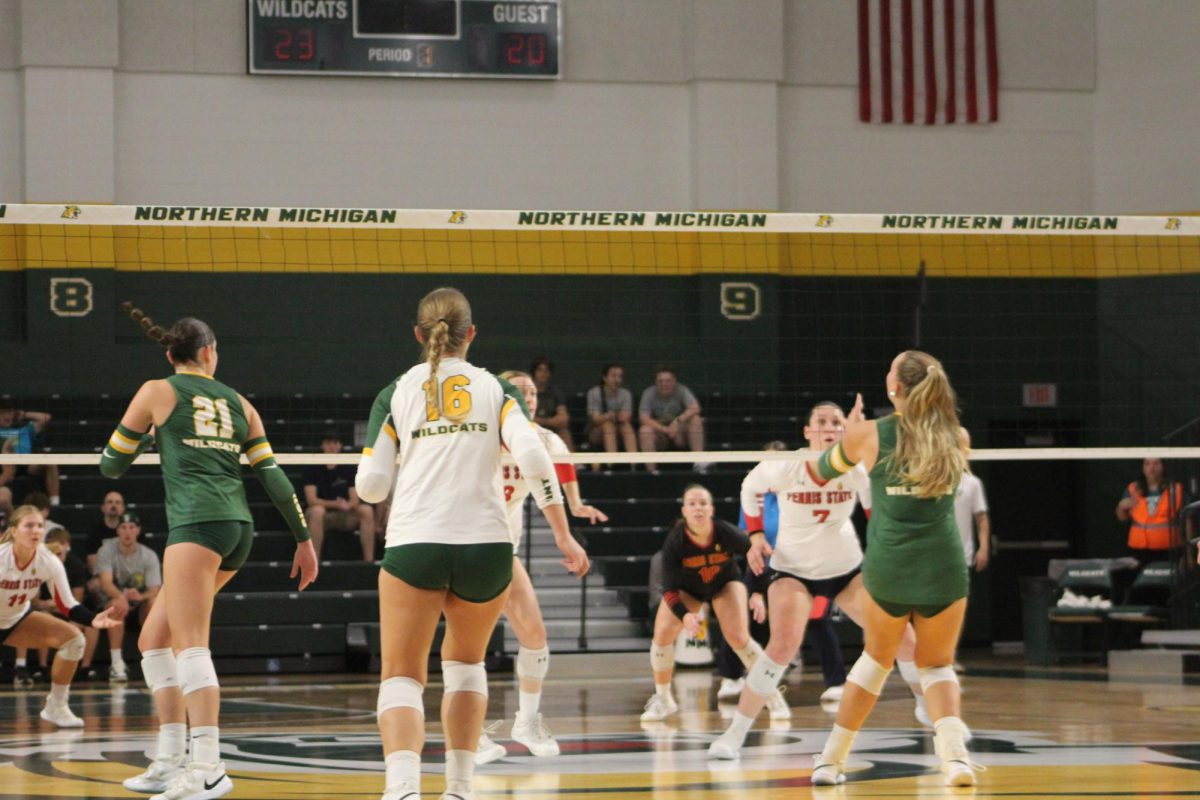Jenna Burkert, a 17 year old wrestler from New York, is one of those exceptions and has been here since her high school sophomore year. She will be graduating from Marquette Senior High School this spring and attending NMU in the fall to continue as an athlete and student.
When five-year-old Burkert brought a wrestling flyer home from school, her parents were completely against the idea. She pleaded until finally her parents gave in because they figured it was just a phase, but they were wrong.
She continued to train on typically-male folkstyle teams through junior high and the beginning of high school which she admits had its rough moments.
“Being the only girl on a boy’s team had its good and bad moments. People would look at me and laugh.” Burkert said.
Even Burkert’s parents got a lot of grief from the wrestling community.
“A lot of people looked down on my parents for putting me in a boys sport” Burkert said. “But no one was going to keep me from doing what I loved.”
After making the switch to women’s freestyle, Burkert said she knew she had made the right choice. Since the muscle strength between boys and girls in high school is so different there is a higher risk for girls to get injured competing against boys.
“Wrestling boys is no joke, you can get hurt, you have to be careful” Burkert said.
All her hard work and persistence eventually paid off. It was at the Cadet 2008 Pan American games in El Salvador the summer before her sophomore year that Tony DeAnda, USOEC assistant women’s wrestling coach, saw Burkert’s potential.
“I noticed she had a lot of strength and hand eye coordination that came from playing lacrosse,” DeAnda said. “I saw that Jenna was a very strong and athletic person to start off with; having all those natural attributes made her a good fit for us.”
Head coach Shannyn Gillespie was excited to bring Burkert in so early in her career because she hadn’t wrestled freestyle for long. Gillespie said he more or less had an ideal athlete coming into his program: a naturally athlete without any bad habits to fix.
“When athletes come in younger they have less skill mastered, so you may be teaching a skill for the first time versus fixing old habits or skills,” Gillespie said. “We are teaching them skills that will make them successful at the senior and international levels.”
For Burkert, it was hard adjusting to moving to Marquette at such a young age and being so far away from her family.
“I came here knowing it was going to be hard leaving home at 15 and training, leaving my parents and my brother who is my best friend,” Burkert said.
DeAnda saw how hard it was for Burkert to adjust to her new life, but believed her dedication to success helped her pull through.
“Moving away from home for her and her parents was hard,” DeAnda said. “It showed her commitment to being an Olympian by sticking it out.”
Burkert was able to adapt and make Marquette and the USOEC her home away from home.
“I really have become a part of the community here, I love my school, I love the town, and I love my friends,” Burkert said.
Once at the USOEC, Burkert’s coaches had a very carefully laid out training and competition plan for her. Coming in at the cadet level (freshmen/sophomores in high school), it was a while before they let her compete on the Senior (18 and up) levels.
“I would have loved to compete at the senior level tournaments last year, but I wasn’t ready, the training has gotten me ready for that,” Burkert said.
Burkert has been a champion at the ASICS/Vaughan Junior & Cadet National Championships, USGWA National Championships (folkstyle), Pan American Games Qualifier in Mexico, Youth Olympic Trials, USA Wrestling Folkstyle Nationals, among other international tournaments.
There have only been a few Junior aged women to compete successfully on the Senior level, and Burkert’s most impressive result on her resume speaks volumes to her skill and training.
Burkert was chosen as the only female athlete to compete in the 2010 Junior Olympic Competition Wrestling competition. The wrestling competition had 80 men and 32 women, with eight participants in each weight class.
“I was chosen as the only -female to wrestle for the United States, it was a great honor to represent USA Wrestling and the USOEC out in Singapore,” Burkert said.
An additional wrestling competition at the Youth Olympic Games that was open to all athletes was beach wrestling, a new and upcoming sport in the wrestling community. Burkert signed up for it and even challenged herself and bumped up a weight class so she would have a deeper weight class to fight through.
After this last minute addition, Burkert was able to leave Singapore with two pieces of hardware: a 2010 Junior Olympic freestyle fifth place medal and a 2010 Junior Olympic beach wrestling third place medal.
Jeff Kleinschmidt, d-irector at the USOEC, is thrilled to see an athlete succeed as such a high level and at such a young age.
“She’s a great student, graduating soon, and progressing as an athlete at the junior and senior international level,” he said.
Coming into an Olympic year, Burkert is looking forward to 2012 Olympics in London, because she knows she made the right choice to come to the USOEC and that the program will continue to help her be successful.
“I’m so thankful for my parents and my brother for being 100 percent supportive of me leaving home to train,” Burkert said. “If someone gave me the opportunity to go back in time, I wouldn’t change anything. It’s made me appreciate my family, made me a better person, and a better -wrestler.”























